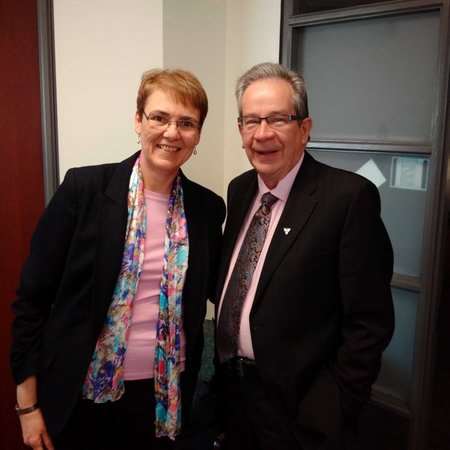Deb Stark reflects on her time as deputy minister and the status of agriculture in Ontario
By Jennifer Jackson
The agriculture industry will miss Deborah Stark, former deputy minister of the Ontario Ministry of Agriculture, Food and Rural Affairs (OMAFRA). She retired in Nov. 2016.
Stark grew up on an Ontario dairy farm and later graduated from the Ontario Veterinary College. She held various senior leadership roles within OMAFRA and the Ministry of the Environment (MOE), including serving as Ontario’s chief veterinarian officer, according to an OMAFRA letter and her Advancing Women Conference biography.
Stark was appointed as deputy minister for OMAFRA in Jan. 2013. She managed various areas of the ministry including research, science and standards, economic development, and food safety.

Photo: @debstark1
Stark recently connected with Farms.com to reflect on her time as deputy minister.
Farms.com (Farms): What do you see as the key challenges for the industry?
Deborah Stark (DS): We are all learning how to live in a digital world with all the opportunities and challenges (it) brings. I was just reading that IBM (International Business Machines Corp.) is applying artificial intelligence to cooking, (for example). The results (of the technology) are food combinations humans might never think of (themselves). It's exciting and a bit daunting.
Given the sector's dependency on trade, I worry about some of the recent global political developments – but I think they will be short-term. Given our land-base, access to water, distribution systems and quality of people, Canada will be a major food-producer for a long time.
The wastage in the food system (also) needs to be dealt with. When Minister Leal and I visited India (in November,) we learned that 40 per cent of (their) crop was wasted in the field. In North America, (this concept is) reversed – we have that level of wastage at the retail/consumer end. No matter where it is in the system, this needs to change.
Farms: What was your biggest accomplishment while in public service?
DS: I have always tried to leave things in better shape than when I came. My very first job involved monitoring the health of beef bulls being performance-tested. I developed a surveillance system so we could see if any big problems were developing earlier.
From restructuring laboratories to improving the province's ability to respond to an animal disease outbreak, creating a bridge between the scientists and policy makers while at MOE, or starting a refresh of the provincial soil maps, I have always spent time preparing the organization for the future.
A big part of (these accomplishments) is about (the) people. Anytime I have left a position, the thing I have been most proud of is the team I built. My biggest accomplishment by far is that smart, enthusiastic people seem to want to work with me – I don't totally understand why, but I never take it for granted.
Farms: What was the most important lesson you learned working with the agriculture community?
DS: Farmers understand that in the end, someone has to do the chores if we want to eat. Also, that many things are beyond our control. You can do everything right (but) if it doesn't rain, the corn won't grow.
People say my style is “straight-shooting” and “pragmatic.” I think I learned (this style) from a lifetime of working with the people who feed us.
Farms: What’s your advice to someone looking to take on leadership role in the industry?
DS: Leadership is about seeing something that needs to be done and stepping up. Focus on making things better and you will find others will follow – when they do, welcome them and work together.
Celebrate the good times; force yourself to study your mistakes and learn from them – never be afraid to apologize (and) have fun.